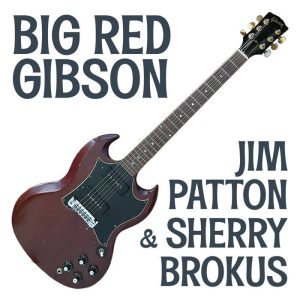Jim Patton & Sherry Brokus – “Big Red Gibson” Album Review
Album Review – Big Red Gibson By Jim Patton & Sherry Brokus
words by Corinna Kelley
Taking inspiration from bands such as The Byrds and Bob Dylan, Jim Patton & Sherry Brokus take us on a folk-rock journey to self acceptance and what it means to choose passion over conventionality, riding the fine line between loneliness and freedom. Their 7th album takes a more acoustic approach to narration, bringing us into their story of freedom, loneliness, heartbreak, and eventual embrace of life’s hardships and beauties.
The opening track, Dead End Town, is exactly how’d you imagine: filled with themes of escape and a desire to stray from the corporate-beaten path. An idea seen time and time again throughout media yet somehow always strikes a nerve. The song contains a more Grateful Dead-esque feel with the background keyboard, inciting an upbeat connotation with the idea of moving on, finding a new life where no one knows your face. This song really encapsulates the entire feel for the album, bringing in the romanticization of starting anew while hinting at underlying emotions that are later explored. The opening and the ending to the song being just Patton’s voice bring about this feeling of being alone while the combination of instruments towards the middle invoke an uncertainty about its effect on his life, he isn’t sure whether this choice was one of good merit or a bitter mistake.
The first of three first-person narratives describes Patton’s life through the lens of regret and what-if’s. He opens with a scene of his first hearing The Rolling Stones which woke him up to a passion he was yet unaware of. He bought his guitar and moved to “Music City” where he started his dreams as a singer-songwriter. This ties back to the first track, yet in this song he looks back on his choices as an older man, one who is unsure of his decisions yet knows his love lies with music. He discusses his back and forth between this life of a wanderer and one who is tied to a job: “I started a new day job/ Just to make it through the year/ Yesterday it was a stopgap/ Today it’s my career.” He seems to have found himself fallen into the very trap that led him to leave his hometown in the first place. His flow throughout the song attributes this feeling of guilt staying with him no matter the choices he makes, but still he can’t seem to let go of that big red Gibson.
A dualistic story of anger yet acceptance combines itself in the track A Road I Never Go Down. In this he mentions an assumed divorce/separation with Rita, a character who in the last song led him to settle down into his corporate career, and a reflection on the time spent with her. He calls himself a wanderer, pitying the time he spent locked into one space for a love not meant to last yet he also knows he doesn’t regret this path in his life. The end verse of the song combines heavy lyrics – “Yeah take that wedding album/ Burn it up/ Put the ashes in that vase/ That your mom gave us” – with a bouncy tone, he’s acknowledging these feelings yet also knows it will all lead to something greater. The fact that he wrote/narrated these stories from an older lens also makes the lyrics deeper in meaning, he has had time to reflect and put stories into the context of his life therefore he is given kind of this superpower of writing, he knows both the character and his feelings in the moment while also knowing how their consequences unfold throughout his life.
Devil’s Highway loops back to the opening track, a retelling of Patton’s escape from reality but this time from a third person narrative. It brings almost a subtle reality hit on the once romanticized cowboy lifestyle he aimed at living— discussing building his world on “alcohol, white powder, and pills— and losing himself within the wanderer image he held. The music adds to an overall feeling of repetitiveness, the gentle tambourines and light guitar highlight the loneliness and constant struggle of the life he chooses to live. The song itself exists in its own loop, the last four lines—”he put all his possessions/ On a Greyhound bus/ Left his family/ In that small town dust” —being the exact ones from the opening holding this mantra of a chosen life of excitement and freedom turned repetitive and cold, almost mirroring the life he chose to leave behind.
Here’s to my Friends introduces a theme explored in this second half of the album about the importance and beauty in human connection, a journey of love that links the entire human race. On his road to self discovery he found himself met with short term isolation yet in the long run found a community of people to love for exactly what they are, for every tragedy and screw up they’ve committed comes a new person and a new beauty unfolded.
Contrasting the previous celebration of life, Patton finds himself back on the path of unveiling the unforgiving nature of our world in the song Pretty Dark World. Though he sings with a bouncy tone, the lyrics he sings are built on dark imagery alluding to Earth being comparable to that of cross-eyed jesters and plagues threatening everything. He is scared of what this world has to offer, knowing that it is a dark path one has to venture on in order to grasp the heart of passion, one he was not sure he could survive.
The next two songs, My Heart’s Turned to Stone and Janey has a Locket, discuss classic tales of love turned sour, heartbreak tales. There’s a repetition of negative phrasing like “don’t” throughout the first song, expressing a desire to change what is, he wants this pain to go away as soon as possible. The second song depicts Patton’s later forgiveness and acceptance through the narrative of a girl Janey who wears an old locket of a past lover. This could be him writing through his ex’s eyes, what he imagines she feels, or it could be his own coming to terms with the time they shared and its own beauty. He describes this time in her—Janey’s— life coming from a place of naivety, filled with drugs and drinking, and moments she regrets. She expresses a desire to make amends although she recognizes that the hurt she left him is all he would hold onto.
Another restless self-discovery anthem, ‘Wild, Dumb, and Unsatisfied‘ captures the youthful spirit of chasing dreams, suggesting that these wild pursuits are essential for personal growth, even if they seem reckless to older generations. It describes a boy who left his life behind with nothing but his keys and a note on a napkin looking for a dream he could barely manifest into words. This is both a celebration and a critique of those who move through life fast, barely scraping by yet on a constant mission to discovery.
Promises to Keep is one of my favorites of the album, connecting the past songs of the restless nature of youth with his now aged view of his life. He celebrates the cowboy life he chose to live, it brought him friends and a connection with the world around him that he thinks most folks his age don’t understand. Patton writes about his fulfillment through his fast-paced life and his continuing to live to the fullest, through adversity and failure he’s chosen to stay true to what he loves til the end.
I Still Believe in You is a perfect end to the abruptness and fast-paced nature of Patton’s adventure. It is in this song where Sherry Brokus’ voice is most prominent, as she is the focus of his lyrics. He sings lovingly of this connection with her that makes the end of his life make sense, all the misery and failures he went through coalesce into a beautiful ending of embrace with one’s own self through the eyes of another.
Jim Patton and Sherry Brokus hold such a level of understanding and passion for their work, this album is a celebration of youth and the bountiful lives we live through human connection and love. Hopefully, one of you will check out some of their songs, I know I will be exploring their discography further!

